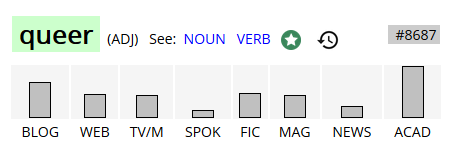Mastering Word Choice with the Corpus of Contemporary American English
By Eli, a Writing Coach
I find word choice to be one of the trickiest parts of academic writing. Even if I’ve used a dictionary or thesaurus to make sure that I’m using a word correctly, there’s still the chance that my reader will find it odd if I use a word that’s uncommon in academic writing or that has an implication I’m unaware of.
When constructing the previous sentence, for example, I picked “odd” out of a list of synonyms. I could have picked “freaky” instead, but that might have tripped up a reader unaccustomed to seeing that word in academic settings. Or I could have picked “queer,” but that might have confused a reader who’s familiar with the academic discipline of queer studies (or who watches a lot of Queer Eye).
In a situation like this, intuition can help, but I prefer to rely on something a little more objective, so I turn to the Corpus of Contemporary American English (COCA). The COCA is a massive collection of text that shows me patterns in the way words are used as well as examples of actual usage. That way, if I suspect “freaky” is a little too informal (or a little too ‘90s), I can figure out whether or not my suspicions are warranted.
To get started, I go to the COCA homepage, which opens on the “List” tab. I want “Word,” so I click on that and enter the word I’m curious about in the search bar.

When I click “See detailed information,” I get a lot of information, and it’s a bit overwhelming. Fortunately, the first thing I want to know is right at the top:

Each of the bars in this graph indicate the frequency of “freaky” in one of the COCA’s eight genres: blogs, websites, TV/movie dialogue, spoken word, fiction, magazines, news, and academic writing. I want a word that occurs in both blogs and academic writing, but this graph tells me that “freaky” is much more common in TV/movie dialogue—nearly five times as common as in blogs, and extremely rare in academic writing. So I decide to consider one of the other synonyms. I’ll try “queer.”

Here, academic writing and blogs are the two contexts where “queer” is used most frequently, so that seems to suit my intent. But I still want to make sure that the uses in those contexts are consistent with my use in this post. There are a couple ways I can do that. First, I check the”Topics” section, which shows what the word is frequently associated with. In this case, it includes words like “sexuality,” “feminist,” and “identity”:

Since I’m not writing about any of those topics, that gives me pause. For more information, though, I scroll down to the list of “concordance lines,” which are samples of real-world text grouped by the pattern they follow. I look for specific examples from blogs and academic writing. When I do, I see phrases like “actualizing a queer space,” “becoming a queer mecca,” and “developing queer kinship”:



That tells me that “queer” typically has a specific meaning in academic works that’s different from the way I’m using it here. I’ll try one more time, with “odd.”

Looking at the graphic, I see that “odd” is a word that’s used in many different contexts. While it’s not common in academic writing, it does occur more frequently than “freaky.” These results don’t immediately convince me that this is the word I want, but they indicate that “odd” might be a good fit. I also note that the associated topics don’t point to a specific use that I’m unaware of, which is a promising sign. I decide to check the concordance lines, so I can see if other writers have used this word in a similar way.




I find examples of academic authors using phrases like “may look odd” and “I find it odd,” so I make an educated guess that “my reader will find it odd” isn’t something that my reader will find odd. And, if it wasn’t something that stood out to you when you were reading the first paragraph, it looks like I was right.
Of course, that’s a lot of work to go to for the sake of a single word, so I don’t pull out the COCA for every word in my draft. For the most part, I use it for checking words that I already suspect don’t match the tone of my draft, as well as for learning how a word I’m unfamiliar with is used in academic settings. However, the COCA can do a lot more than that—it’s a useful tool for all kinds of questions about English use, as well as a lot of fun to just play around with. If you’re interested in learning more, I recommend the guide here.
This blog showcases the perspectives of UNC Chapel Hill community members learning and writing online. If you want to talk to a Writing and Learning Center coach about implementing strategies described in the blog, make an appointment with a writing coach or an academic coach today. Have an idea for a blog post about how you are learning and writing remotely? Contact us here.

